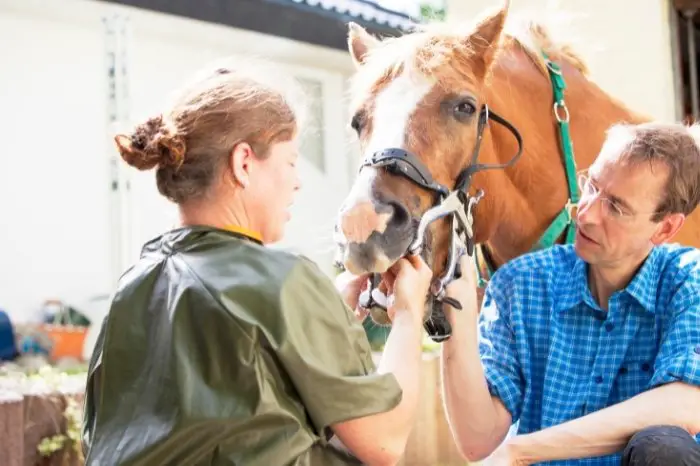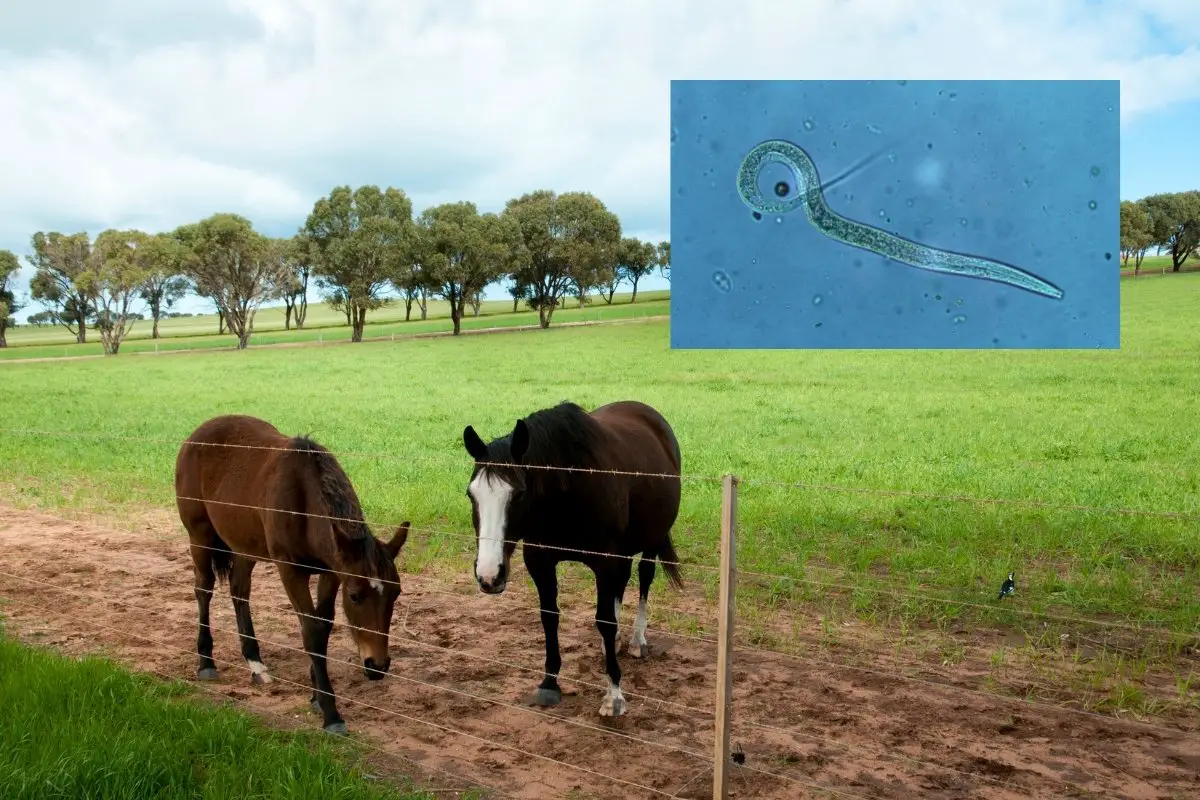Last Updated on May 26, 2022
Strongyles are something that no horse owner wants to deal with. So, what do strongyles do? These nasty parasites can wreak havoc on your horse, leading to all sorts of problems for horses.
Strongyles are a relatively common parasite that horses can get. Fortunately, they are treatable and precautions can be taken to prevent your horse from getting them. It is important to know what strongyles are, how to prevent them, and how to get rid of them to keep your horse happy and healthy.
What Are Strongyles? – What Do Strongyles Do?
Strongyles are a type of nematode worms that are often parasitic in the gastrointestinal tract of mammals, particularly those that graze. They are grouped in either large or small strongyles, with the three main types of large being Strongylus vulgaris, Strongylus endentatus, and Strongylus equinus.
The adult form of both large and small strongyles live in the large intestine of animals. The adult strongyles then produce eggs that are passed through the feces of grazing animals. These eggs then develop into infective larvae that live in pastures or in stalls.
A horse becomes infected with strongyles when it consumes grass, feed or water contaminated with infective larvae. These larvae are very hardy, as they are able to adapt to harsh environmental conditions due to their protective sheath. They are capable of surviving in a freezing environment, but a hot and dry environment will generally kill them.
The infective larvae can survive up to 31 weeks at winter temperatures, whereas they can only survive up to seven weeks at summer temperatures. Strongyles are prolific egg layers, with the capability of a single horse being able to pass up to 75-100 million eggs daily.
Read more about Can A Mare Abort One Twin?
Small Strongyles
Small strongyles tend to be more difficult to deal with than large strongyles as they are able to enclose themselves within a cyst within the intestinal wall. Once they do this, they become resistant to many antiparasitic drugs.
Large Strongyles – What Do Strongyles Do?
Strongylus edentatus take about nine months to mature, spending that time traveling through the abdomen, in organs such as the liver and the pancreas. At maturity, it can reach four to five centimeters long, at which time it returns to a part of the intestine known as a caecum.
Strongylus equinus has three teeth and can grow to be about five centimeters in length. When they have been consumed, they journey to the veins that lead to the liver. Once in the liver, they take approximately eight weeks to develop before again traveling to the intestine to produce more eggs.
Duramectin Ivermectin Paste 1.87% Horse Wormer (2 Tubes)
Strongylus vulgaris is the most dangerous type of strongyles species that affect equines. It has two teeth and is smaller than the other large strongyles at about two centimeters in length. They settle in the blood vessels where they can lead to dangerous complications like blood clots and blood loss.
Check Out What Does Gelding a Horse Mean?
How Do Horses Get Strongyles? – What Do Strongyles Do?
Horses get strongyles by consuming grass, feed or water contaminated with infective larvae. The most common way for horses to get strongyles is to eat grass that contains infective larvae. Once the larvae enter a horse’s body, they proceed with their life cycle.
What Do Strongyles Do?
Stronglyes can cause all sorts of problems for horses. Large strongyles can lead to colic, amenia, dehydration, depression, diarrhea, weakness, fever and loss of appetite. Small strongyles can cause weight loss, colic, diarrhea, intestinal pain, fibrous cysts in the cecum and colon, neutrophilia, hypoalbuminemia and hyperglobulinemia.
Strongyles rely on horses and other grazing animals as their food source and to spread their eggs. They feed off of the blood of horses, causing damage to the blood vessels and the mucous membrane. Strongyles will spend the majority of their life cycle in the gastrointestinal tract of mammals.
How To Prevent Strongyles
To prevent strongyles, deworm your horses on a regular basis at the same time to prevent the spread of strongyles. In addition, be sure to remove manure from stalls and pastures on a regular basis, as they spread through feces.
When bringing home a new horse, allow them to quartine first before turning them out to pasture with other horses. If you suspect a horse may have strongyles, monitor their manure and talk to your veterinarian.

How To Treat Strongyles
When treating a horse with strongyles, electrolytes may be administered if the horse is struggling with dehydration. Anthelmintics or antiparasitic drugs are then generally administered based on a horse’s body weight. Your veterinarian may provide additional care if your horse has a serious case of strongyles.
Be sure to regularly administer dewormer to your horse to help prevent worms. Some horses may benefit from being on a daily dewormer.
Dealing With Strongyles In Horses
Strongyles are a common type of parasite that affects the gastrointestinal tract of horses and other grazing animals. They can lead to all sorts of problems including colic, amenia, weight loss and weakness. Fortunately, regularly administering dewormers and removing manure from pastures and stalls can prevent them.
Do you have any questions regarding what do strongyles do? If so, please ask any questions regarding preventing and treating strongyles in horses.


